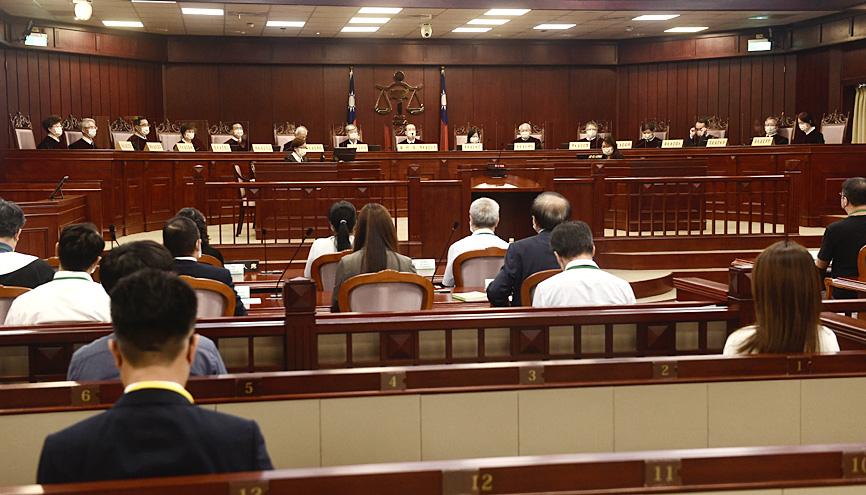The nationalization of Taiwan’s 17 irrigation associations under the Agency of Irrigation in July 2020 did not contravene the Constitution, the Constitutional Court ruled yesterday.
The move did not contravene the principle of legal clarity, nor people’s freedom of association, guaranteed by Article 14 of the Constitution, said Judicial Yuan President Hsu Tzong-li (許宗力), who heads the Constitutional Court.
The nationalization process did not infringe on property rights, nor did it violate the non-retroactivity principle or the principle of legitimate expectation, Hsu said.

Photo: Tsung Chang-chin, Taipei Times
Chinese Nationalist Party (KMT) legislators said the nationalization of the irrigation associations under the Irrigation Act (農田水利法) was disproportionate and amounted to stealing from the public.
The irrigation agency was established without amending the Organizational Act of the Council of Agriculture (行政院農業委員會組織條例), and therefore breached the legal reservation principle and the Act Governing Central Administrative Agencies and Organizations (中央行政機關組織基準法), the legislators said.
The agency was founded via executive order, instead of by following due process, they said.
The Taoyuan irrigation association, a plaintiff in the case, said the act breached its members’ freedom of association, infringed on their property rights and endangered their livelihood.
The Executive Yuan countered the argument, saying that irrigation associations are public legal persons that provide indirect administrative oversight on behalf of the government.
Therefore, the former irrigation association system was not based on constitutional rights and the associations cannot ask for basic guarantees under the Constitution, the Cabinet said.
Taiwanese expect improvements to food safety, and fair and efficient use of water in light of changing agricultural practices amid concerns over climate change, the Council of Agriculture said.
These are expectations that the irrigation associations, many of which were mired in financial and administrative issues, could no longer meet, the council said.
The need to nationalize the associations into a government agency was urgent and necessary, it said.
The government initiated dialogue with the associations and the public to ensure they are involved in every step of the transition, the council added.

CHAOS: Iranians took to the streets playing celebratory music after reports of Khamenei’s death on Saturday, while mourners also gathered in Tehran yesterday Iranian Supreme Leader Ayatollah Ali Khamenei was killed in a major attack on Iran launched by Israel and the US, throwing the future of the Islamic republic into doubt and raising the risk of regional instability. Iranian state television and the state-run IRNA news agency announced the 86-year-old’s death early yesterday. US President Donald Trump said it gave Iranians their “greatest chance” to “take back” their country. The announcements came after a joint US and Israeli aerial bombardment that targeted Iranian military and governmental sites. Trump said the “heavy and pinpoint bombing” would continue through the week or as long

TRUST: The KMT said it respected the US’ timing and considerations, and hoped it would continue to honor its commitments to helping Taiwan bolster its defenses and deterrence US President Donald Trump is delaying a multibillion-dollar arms sale to Taiwan to ensure his visit to Beijing is successful, a New York Times report said. The weapons sales package has stalled in the US Department of State, the report said, citing US officials it did not identify. The White House has told agencies not to push forward ahead of Trump’s meeting with Chinese President Xi Jinping (習近平), it said. The two last month held a phone call to discuss trade and geopolitical flashpoints ahead of the summit. Xi raised the Taiwan issue and urged the US to handle arms sales to

BIG SPENDERS: Foreign investors bought the most Taiwan equities since 2005, signaling confidence that an AI boom would continue to benefit chipmakers Taiwan Semiconductor Manufacturing Co’s (TSMC, 台積電) market capitalization swelled to US$2 trillion for the first time following a 4.25 percent rally in its American depositary receipts (ADR) overnight, putting the world’s biggest contract chipmaker sixth on the list of the world’s biggest companies by market capitalization, just behind Amazon.com Inc. The site CompaniesMarketcap.com ranked TSMC ahead of Saudi Aramco and Meta Platforms Inc. The Taiwanese company’s ADRs on Tuesday surged to US$385.75 on the New York Stock Exchange, as strong demand for artificial intelligence (AI) applications led to chip supply constraints and boost revenue growth to record-breaking levels. Each TSMC ADR represents

Pro-democracy media tycoon Jimmy Lai’s (黎智英) fraud conviction and prison sentence were yesterday overturned by a Hong Kong court, in a surprise legal decision that comes soon after Lai was jailed for 20 years on a separate national security charge. Judges Jeremy Poon (潘兆初), Anthea Pang (彭寶琴) and Derek Pang (彭偉昌) said in the judgement that they allowed the appeal from Lai, and another defendant in the case, to proceed, as a lower court judge had “erred.” “The Court of Appeal gave them leave to appeal against their conviction, allowed their appeals, quashed the convictions and set aside the sentences,” the judges